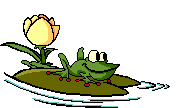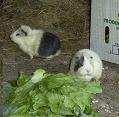 |
Bungala Ridge Permaculture Gardens REDUCE ... REUSE ... RECYCLE ... REPAIR ... RETURN ... REVEGETATE ... REPLENISH |
||||||||
|
|||||||||
|
|
We are what we eat! It's taken me a long time to learn how to garden effectively. Over time I found that one of my greatest stumbling blocks is that I wasn't growing the things we liked to eat. Usually the easiest to grow vegies are the ones we liked the least, and thus they either stayed on the plant and went to seed, or found their way into the guinea pig or poultry yards. Meanwhile continuing health problems prompted me to consider diet a major factor in chronic illness. I was slow to digest the information I researched and reluctant to give up the foods that created ill health in my body. My vegie garden and orchard didn't obtain the attention they deserved and my interest in gardening waxed and waned. My belief in permaculture as a 'cure all' kept me coming back to the small patch of earth that sometimes resembled a vegie garden, but more often than not was a thriving patch of juicy weeds for my feathered and furry friends.Eventually I came to fully understand the catch cry "we are what we eat", but even then it was hard to change my eating habits. I knew that the only way to change my diet was to focus more on gardening, and decided to grow only those things that I knew we'd eat. This meant that a good portion of our fresh food was coming from the garden, rather than the supermarket. Most of the vegies in the supermarket didn't have the strong taste of home grown vegies. It took a couple of years to not only get used to this. Salads have been transformed from a few pieces of tomato, iceberg lettuce, and cucumber to a plate full of mixed mesculin lettuce, herbs, silverbeet, rocket, grated carrot and beetroot, sugarsnap peas and whatever else looks appetising in the garden! Two years ago, after suffering from weight problems forever, with a liberal dose of heartburn and indigestion experienced daily, I gave up bread as a staple in my diet. The results were stunning. I suddenly had stamina, my brain seemed to function better, I lost the 'sleepy' feeling after eating, and I wasn't continually hungry. It took me a year to convince the rest of the family to give up bread and we're still working on reducing wheat and other grains to just one meal a day. I realised that most people eat wheat for breakfast, lunch and dinner and many snacks in between. That can't be healthy, especially since humans only began doing this in the last ten or so thousand years - compared with a million years or so of evolution. Watch this space ~ coming soon:
|
Hot Links!
This site is sponsored by
|
|||||||
|
|
|
|
|||||||





